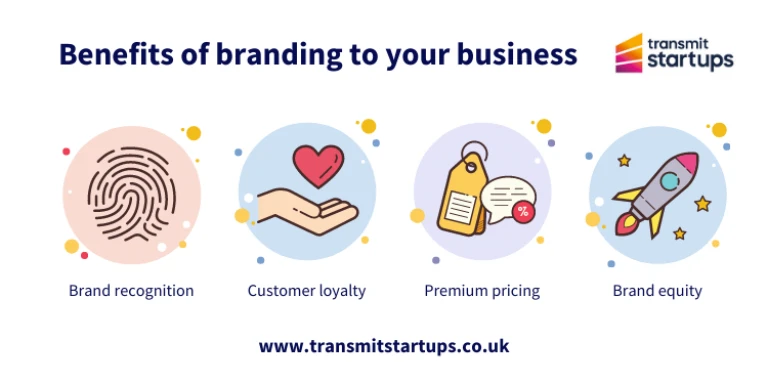Branding for small businesses and startups: 7 reasons you NEED to brand your business
HOME / / Branding for small businesses and startups: 7 reasons you NEED to brand your business

What is small business branding?
Branding is one of those terms that means different things to different people. Some people think branding their business just means having a recognisable logo, but that’s just the start.
Branding is everything you do to make sure customers see you in a certain way. And using the way people see you to increase sales and profits.
A classic example of branding is designer clothing. The addition of a designer label to plain white tee can add ££ to the price tag. The company isn’t just selling a t-shirt, they’re selling how it makes the customer feel and what it says about them.
Because of branding, designer clothing companies have customers flocking to buy their products and pay a premium to wear them.
Our Guide to Creating a Brand for your Business is jam-packed with information about how to apply brand to your small business, so check that out once you’re finished here.
What are the benefits of branding?
1 Customer attraction
As you can see from the example above, branding is closely linked to marketing and pricing. So thinking about brand at the start of your business adventure is more likely to make it a success. Make it part of your business plan.
It also runs through everything else you do, like the décor in your physical premises; the design of your website; the uniform your staff wear; and your tone-of-voice on social media. So thinking about brand early helps you get all of this aligned, to ensure your business brand is clear and consistent in everything you do.
2 Brand recognition
We’re more likely to buy brands that we’re familiar with. We know what to expect and what they offer. That’s why low-cost supermarkets often mimic the design of established brands to sell their own brand products. If you’ve ever been tricked into buying Notella instead of your usual chocolate hazelnut spread, you’ll understand. Having a recognisable brand can lead to more sales.
3 Customer loyalty
Costa, Starbucks or Caffé Nero? The likelihood is you have a preference. Customers are extremely loyal to the brands they love. If customers form an emotional connection with your brand, you can create repeat custom and reduce the cost of acquiring new sales. In business terms, that’s lower cost-per-acquisition and higher lifetime value.
4 Premium pricing
The brands we buy send out strong signals to the people around us, whether that’s the telltale flash of red from the sole of a Louboutin shoe or quiet kudos of your electric car as it slides silently through the streets. Perception can play a major role in our buying decisions. If your brand says something positive about your customers – their success, their environmental credentials, their youthfulness, their ‘good taste’ – you can charge a premium as customers pay to be associated with the brand. Think about brand in the context of your pricing strategy.
5 Brand equity
Having a strong brand makes it easier to launch new products. If you already have a loyal following for one product in your range, it is easier to hit the high street with the next. Think about the evolution of Malteasers, for example. You can now buy Malteaser bunnies, bars and buttons. If these products hadn’t been part of the Malteaser family, people would have been much slower to give them a go.
6 Customer trust
Your brand helps build customer trust by presenting a consistent experience across everything you do. For example, parents are far more likely to believe in a child-friendly café that provides free baby food and has wipe clean surfaces, than one that has expensive soft furnishings and nothing on the menu for under 5s. A consistent brand shows you understand your customer needs and are completely dedicated to them. Check out our guide on How to Create a Brand for a full breakdown of brand decisions for our imaginary cafe.
7 Decision-making
Your brand can also make it easier to make business decisions, especially when you are growing your business. Simply by asking yourself if something is ‘on brand’ for your business can help rule out unsuitable ideas and opportunities. It all ties back into your business plan.
For example, Malteasers might consider adding a biscuit to their brand family, but they’d probably not consider crisps. And our family friendly café might think about moving into the soft play sector but they’re unlikely to invest in a DIY store. Smaller decisions are simpler too – where to advertise, what social media channels to use, what products to stock.

"We’re delighted to be the 2000th loan recipients!"
